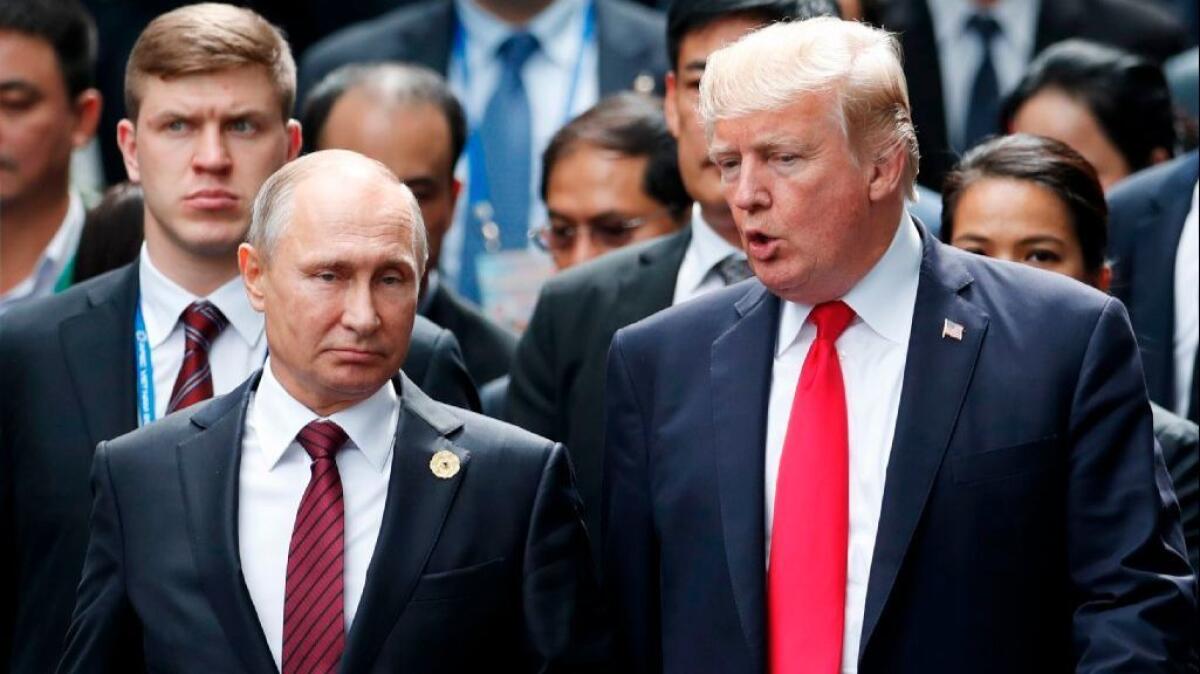Column: Is Trump turning the U.S. into Putin’s Russia?

- Share via
Those seeking richer context for the modern friction between the United States and the Russian Federation might leave off — for a weekend, anyway — reading profiles of superspy Christopher Steele and even indictments of Russians by special prosecutor Robert S. Mueller III.
Instead, try two ferocious new documentaries about Russian and American spycraft.
For the record:
12:35 p.m. March 12, 2018This op-ed originally stated that the Academy ruled “Wormwood” ineligible for the Best Documentary Feature category because of scripted scenes. Actually, the Academy said it disqualified “Wormwood” because it’s episodic.
Taken together, Errol Morris’ “Wormwood” and Bryan Fogel’s “Icarus” illuminate 65 years of the two nations’ mutual incomprehension. They show how fear of the other great power plunges each country into paranoid, twisted and murderous intelligence operations.
Is the U.S. under President Trump becoming Russia, its terrified and fractious population ruled by a klepto-autocrat who aspires to Russian President Vladimir Putin’s ruthlessness and greed? Or might we yet assert our cherished rectitude and define our country against Putin’s Russia once again? These urgent questions nip at the edges of the two movies.
“Wormwood,” a six-part series on Netflix, revisits the gothic death of Frank Olson, a CIA bacteriologist who died in 1953 at the hands of his bosses. He was either a casualty of a sadistic LSD experiment by the U.S. government, or — as wily investigative journalist Seymour Hersh insists — of an outright execution. (The film reports out Hersh’s incendiary thesis, and gives it credence.)
Is the U.S. under President Trump becoming Russia, its terrified and fractious population ruled by a klepto-autocrat?
Morris’ casting of SAG actors in lavish sepia-noir reenactments had some critics asking whether it was really a “documentary.” No matter: Morris’s hallucinatory collage simultaneously conceals and reveals the truth of Olson’s death, in the manner of espionage and history itself. Also in the manner of LSD. To tell a story of sloshed, tripping, paranoid, self-important and delusional midcentury CIA chain-smokers in the straitened “Frontline” style would be dishonest.
Morris appears in the film, listening, rapt, as Olson’s son, Eric, describes a “mind-control” program of the Korean War-era CIA. Convinced that the Soviet Union was using “psycho-chemicals” to loosen the lips of American prisoners, CIA agents tested LSD on Olson, who was secretly nursing doubts about American denials that the military used biological weapons in Korea.
CIA mind-controllers wanted to see if Olson could keep secrets — that is, could lie on command — while dosed. Evidently, he couldn’t. The agency later copped to the LSD experiments and told the Olson family that Frank, unable to hold his drugs, lost his stuffing and jumped out of a hotel window.
The Olson tragedy, as Morris renders it, is founded in projections about the riddle-mystery-enigma that Russia has always represented to the West. For fear of their mind-control measures, we undertake our own. With fatal consequences.
This sounds familiar. In chain-smoking days, we feared biowarfare and the mind control of chemical weapons, hypnotists and hallucinogens. In Twittering days, we fear viral memes, and the mind control of botnets and troll farms.
The second film, Bryan Fogel’s “Icarus,” which won the best-doc Oscar last weekend, follows a whistleblower, Grigory Rodchenkov, as he seeks — at great peril — to tell the truth about Russian doping at the 2014 Sochi Olympics.
As in “Wormwood,” the filmmaker appears as a naive listener cornered by a nerve-jangled old man who unfolds a geopolitical farrago. That farrago is not just stranger than fiction; it’s orders of magnitude more complex.
Rodchenkov in Russia, like Olson in the U.S., was expected to play an upright citizen and biochemist for his country, while also conspiring in a secret state-sponsored doping program. (If LSD is a kind of dope, a “state-sponsored doping program” is also what the U.S. ran for 20 years.) Rodchenkov’s earnestness, panic and pathological urge to tell the truth, even if it kills him, recall Olson’s.
At the time of the Sochi Olympics, the Kremlin was convinced that other national teams were doping despite stringent efforts to police it. So they undertook to hack the anti-doping measures. This put everyone — including Russia’s athletes, whose biochemistry they damaged with anabolics — at extreme risk.
When Rodchenkov speaks out, his government hunts him. But unlike one of his colleagues, and unlike Olson, Rodchenkov escapes with his life. He currently resides in the U.S., in witness protection.
In any kind of arms race between the U.S. and Russia, the old caricatures reemerge. The Kremlin represents the U.S. as sanctimonious and hypocritical, pretending not to be as corruptible, greedy and racist as everyone else. The U.S. represents Russia as devious, malicious and warlike.
And then we bring these cartoons into being. Trump and his syndicate have proven themselves to be every bit as corruptible, greedy and racist as Putin believes all Americans to be. In turn, Russia’s state-sponsored mind-control programs — in the form of troll farms and botnets — reflect our intelligence agencies’ most dire warnings.
As usual, the nations scare the hell out of each other. And scared nations are scary. In this terrified atmosphere, the truth is elusive. Is there collaboration between Trump and the Russian oligarchs? Why haven’t we implemented sanctions against Russia? And what does the Kremlin want?
If we’re ever to find justice and peace between the nations, we don’t need more disinformation and propaganda. We need whistleblowers and truth-tellers like Olson and Rodchenkov.
Twitter: @page88
Follow the Opinion section on Twitter @latimesopinion or Facebook
More to Read
A cure for the common opinion
Get thought-provoking perspectives with our weekly newsletter.
You may occasionally receive promotional content from the Los Angeles Times.









